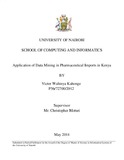| dc.description.abstract | Data mining which is often referred to as Knowledge Discovery in Databases (KDD) is a subdiscipline
of computer science aiming at the automatic interpretation of large datasets. Its end
result is the extraction of meaningful patterns from data to aid in the process of decision making.
Data mining is a discipline that is applicable to all subject areas from aviation to zoology as most
have transaction data.
Historical data from permits prior to the proposed system is of high value regardless and is of
great interest to the study as it proposed to enhance usability of such data for decision purposes.
All data on imports and exports available electronically was captured through the data capture
system. Currently, PPB uses regular queries in its databases to generate reports. These reports
only present one facet of data without presenting the true picture to the concerned decision
makers leading to inaccurate decisions.
Objectives of the study were to analyse data on imports and exports of pharmaceutical products
in Kenya and discover patterns of association and correlation between the various
pharmaceutical product groups.
The study adopted the CRISP-DM framework for data mining and utilised RapidMiner as a tool
for data analysis and mining. CRISP-DM is a generic framework that is applicable in most
subject areas and is quite tested. RapidMiner is an open source data mining tool that is quite
popular world-wide due to its capabilities, ease of use and availability of online help. This study
applied data mining to the field of pharmacy regulation. The study analysed data on imports of
pharmaceutical products for interesting patterns. The study performed correlation and
association analysis on the import data.
The study proved that there exist patterns in pharmaceutical import data. The patterns are also
similar to prescription patterns from studies in Ethiopia, Nigeria and India especially on
association of several pharmaceutical product groups. | en_US |

